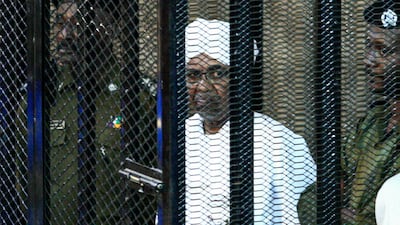It is easy to imagine that somewhere in a prison cell in Khartoum, Omar Al Bashir is seething. Victims of his alleged atrocities and proponents of international justice alike can take some comfort in that fact. For more than a decade, the former Sudanese president’s rule was an insult to his victims as well as a thorn in the side of the International Criminal Court (ICC).
The ICC issued arrest warrants for him in the late 2000s on such charges as war crimes, crimes against humanity and genocide in Darfur. But with every opportunity he was given, Al Bashir undermined the court. Now the country he once ruled is gearing up to join the ICC. This is a significant decision for Sudan and a victory for the court.
Last week, Sudan's Prime Minister Abdalla Hamdok announced via Twitter that his cabinet had unanimously passed a draft bill that would see the country join the Rome Statute of the ICC. There remain a few steps before Sudan officially joins the court. Crucially, its joint military-civilian council still has to approve the decision. But it is hard to overstate the significance of this move for the country.
Joining the ICC sends an important signal to Sudanese citizens that political authorities are committed to addressing international crimes. As Mr Hamdok stated in his announcement: “Justice and accountability are a solid foundation of the new, rule of law-based Sudan we’re striving to build.” The focus of many observers will be on addressing alleged atrocities in Darfur, but it has been alleged that the previous regime committed crimes elsewhere, and violence perpetrated against civilians protesting Al Bashir’s rule in 2019 demands accountability.
Becoming a member of the ICC may help curtail possible abuses by elements within the Sudanese military forces who still retain a high degree of influence in determining the course of the country’s political transition. Some members of the military have been accused of committing atrocities in Darfur and elsewhere in the country. Joining the ICC, therefore, potentially draws a line in the sand and encourages all sides in Sudan to get on board with a transition that includes a commitment to giving the ICC jurisdiction over any atrocities committed in the country. It could put some wind in the sails of those who want to see powerful figures brought to justice.
This is easier said than done, of course. Pursuing justice during transitions is a delicate endeavour. Some members of the military are still in a position to thwart Sudan’s transition, perhaps especially if they feel threatened by prosecution.
Sudan’s move may be just as significant for the ICC. Since being issued arrest warrants in 2009 and 2010, Al Bashir has posed headaches for the court, regularly deriding it as a neo-colonial body bent on prosecuting African figures. While never a popular figure on the continent, Al Bashir managed to convince the African Union and numerous states to join his tirade against the court. Al Bashir also regularly travelled abroad – including to member-states of the ICC, including South Africa and Uganda – thumbing his nose at the warrants against him.
Ultimately, it was not the ICC or any other international body but the people power of Sudan that tripped up his rule and deposed him in 2019. Nonetheless, the court will see this as a victory of sorts and probably enjoy a bump in its global standing as a result. Sudan’s step towards joining the ICC will grant the institution a powerful rhetorical means to counter the narrative that it is preoccupied with targeting African heads of state.

Still, questions remain. Al Bashir is in detention in Khartoum and two others wanted over atrocities committed in Darfur – Ahmad Harun and Abdel Raheem Muhammad Hussein – are likewise imprisoned in Sudan. Authorities have intermittently suggested that Al Bashir will be prosecuted by the ICC, but whether that happens in The Hague or in Sudan is uncertain. Moreover, Al Bashir’s case would represent the first time that the court prosecuted anyone for genocide, a notoriously difficult crime to investigate. For ICC prosecutors to succeed, it will be just as important for Sudanese authorities to co-operate in collecting and sharing documentary evidence of Al Bashir’s alleged atrocities as joining the court.
A question remains as to whether Sudan’s move will reverberate beyond North Africa and The Hague. Samantha Power, who heads the US Agency for International Development, was quick to rejoice the announcement. But with her own administration in Washington paying close attention, might the US find inspiration in Sudan's move rather than simply celebrating it?
No country played a greater role in pushing for accountability in Darfur in the mid-2000s than the US. Despite attacking and seeking to isolate the ICC, the administration of George W Bush permitted the UN Security Council to refer the situation in Darfur to the ICC in 2005. In doing so, however, the US included provisions that would protect American citizens from ICC jurisdiction and ensured that the court would not receive any financial support from the UN. The result was the entrenchment of double standards and few, if any, tangible results for justice. This fed directly into African concerns about the court being controlled by the Security Council and states, including the US, which had no interest in joining the ICC. For many, these so-called double standards remain untenable.
But fast-forward 16 years and Sudan, a state that was once determined to attack the court at every turn, is on the verge of joining it. That in itself is remarkable. Many hope that other states, including the US, will find inspiration in Sudan's decision and eventually follow suit.


